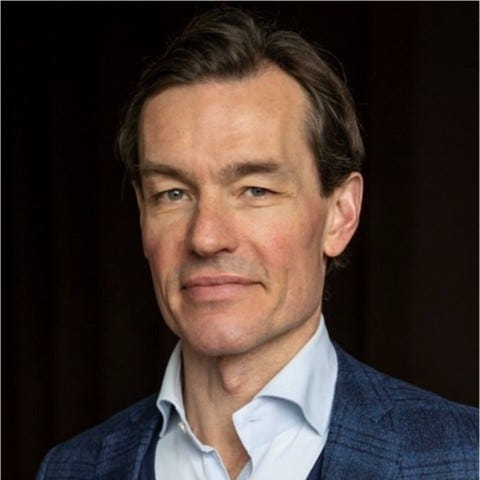#11: The role of venture capitalists in the start-up ecosystem
Hi, I'm Jeppe and welcome to my weekly newsletter on Corporate Venturing, released every Tuesday. My aim is to provide a comprehensive perspective on the latest developments in the field and its related topics, drawing from the insights of top management, venture capitalists, founders, LPs, and family offices. I aim to offer valuable information and thought-provoking content that will aid in understanding the importance of Corporate Venturing in business strategy.
This weeks newsletter is co-created with Rolf Kjærgaard, Strategic Advisor for Companies and Venture Funds and former CEO of Denmark`s Export and Investment Fund
I've worked with Rolf since 2007 on multiple funds through my journey in Venture Capital.
The topic of today is "The role of venture capitalists in the start-up ecosystem". Rolf shared his invaluable insights from many years as a key decision maker in the start-up ecosystem. Below you can find our dialogue.
The current state of the start-up ecosystem
How has the European start-up ecosystem evolved over the years and what are the current trends?
The European venture ecosystem is in a totally different state than it was just ten years ago. There has been much change, with many more stakeholders participating in the ecosystem. Within the development of venture capital, we now see two types of funds: generalist and specialist funds.
Generalist venture capital funds invest in a broad range of industries and sectors. They typically have knowledge about platforms and assist their portfolio with strategy, business development, scaling, and networking. They typically have a diversified portfolio of companies from various industries and stages of development, ranging from early-stage to later-stage.
Specialist venture capital funds, on the other hand, focus on a specific industry or sector, such as healthcare, fintech, or artificial intelligence. They typically have a deep understanding and expertise in their chosen field, and can provide valuable industry-specific knowledge, networks, and resources to the companies they invest in. Specialist funds often invest in early-stage companies that have significant growth potential in their specific area of focus.
"European Venture Capital now have three clear stages. ", Rolf Kjærgaard
Venture Capital now have different stages.
1.Commercialisations. This is projects comming out of universities and companies. We don't see as many new projects in Europe as in the US but its of essence that Europe becomes even better in getting these projects out so that they can be developed in the ecosystem.
2.Venture. The venture capital industry covers the early stages of a company's life, from pre-seed to close-to-break-even stages (Series B to C). At the pre-seed stage, many companies are funded by business angels who have become increasingly professional and now understand the difference between being a founder and investing in one.
"Deal syndication and deal sharing is essential for the development of the ecosystem ", Rolf Kjærgaard
In the past and even up until today, we have seen too many players in the startup ecosystem who are unwilling to share their knowledge. Fortunately, with the increasing specialization within investment stages, venture capitalists are showing more signs of collaboration. Funds now understand that they are dependent on collaborating with other funds that operate in earlier or later stages of the ecosystem
"increased awareness around creating value together", Rolf Kjærgaard
Over the past decade, we have witnessed an improvement in investment conditions, with later-stage investors creating a more profitable environment for early-stage investors and founders.
One of the key factors behind this is the awareness of creating value together, which has led to investors using preferential investment instruments less often and having a greater inclination to align with founder interests when investing.
3.Growth investments. Europe is significantly behind in this stage, with only a few specialized funds compared to almost 50 in the US. This gap needs to be bridged in order to support European scale-ups in growing in the best possible way. It is well-known that keeping investment in Europe will have a significant impact on creating more start-ups in the region.
The impact of government investment
Government funds need to play a complementary role. It's about being a lever for private capital. It needs to be understood that governments play that role and that they are a long-term player in the ecosystem. Governments are also a structural partner to private investors. This means that during economic cycles, they will try to even out these cycles by being a higher percentage of investments in downturns and less so during upturns.
Governments are also participating in the allocation of soft money. Soft money typically refers to non-dilutive capital that a startup can receive in the form of grants, subsidies, or other types of funding that do not require the company to issue equity. These types of allocations make it easier for projects in the early stages to receive funding, thereby making it possible to create more companies.
Final comments by Rolf Kjærgaard
The ecosystem is much stronger today than it was 15 years ago, and all stakeholders can be proud of what it has become. Now, it's time to take it to the next level and focus on commercialization. We can get even more out of our research by creating more pull mechanisms, especially in Denmark. Compared to a country like Israel, which is three times as effective at commercializing their research, there is room for improvement.
Additionally, we are still waiting to see more growth funds in Europe. Denmark does not have one yet, but hopefully, that will soon change.
I hope you enjoyed this week's newsletter. I will take a short break with my newsletters as I'm out on vacation for the next two weeks spending time with my family. When returing I will have more interviews to share.
If you have any suggestions or contributions that you would like to share with me, please do not hesitate to reach out. I would be delighted to hear from you.
/Jeppe


